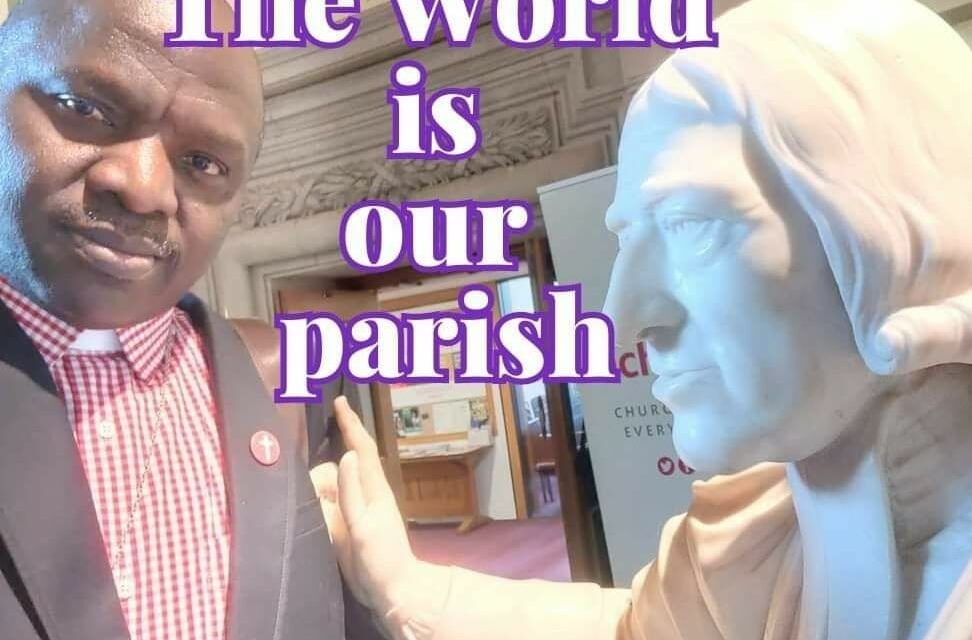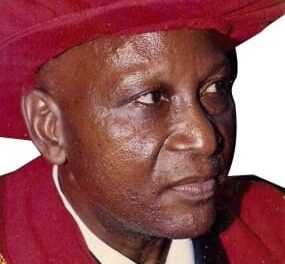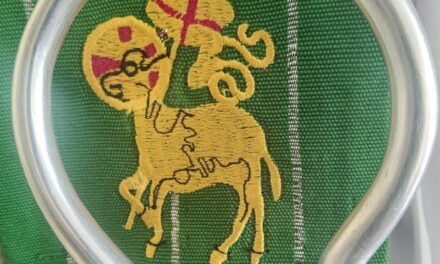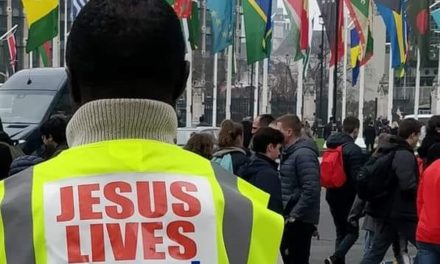A prophet is not without honour, save in his own country and in his own house – Matt 13:57.
The Church’s prophetic role is to be a constant presence in the world’s public life. However, it is sad that this role is lost, especially in a culture that is now secular, agnostic or overly hostile to any expression of the Christian faith. There is a need to recover the prophetic role and ministry for the growth and health of the Church and public life. Beyond the call to a “prophet-hood of all believers,” [1] the importance of prophetic ministry and biblical hermeneutics cannot be jettisoned despite their distortions by Christian imperialism and the condition of Modernity. Modern theology gives greater power to man and woman, the creature, to determine how and when he or she decide to respond to God’s great offer of salvation as if we are both immortal and sovereign (Heb 2:1).
The biblical foundation for prophetic ministry with reverence and discernment is available to all who are filled with the Holy Spirit. The prophetic ministry continues to play missional and renewing roles in shaping the course of the Church and equipping believers. Since its inception, the prophetic ministry has not been without those sceptical, its abuse by false prophets, its usefulness, and its validity. In Methodism, the prophetic ministry has continued to be a vital part of John and Charles Wesley and other notable leaders through words of knowledge or wisdom, preaching, use of hymns, prayers, bringing a sense of warning, peace, judgement, repentance, joy, direction, and a sense of purpose for the people. Sadly, today, our numeric decline is complicated by our decline in the vitality of worship in many churches. The present condition of Methodism has no straight-line traces to the beginnings of the Methodist movement. For example, Christian worship practices are ‘informed by and revelatory of the theology, ecclesiology, and organisational understandings of a faith tradition.’ Is our worship today recapturing the Spirit, theology, and intention of Methodism? Following John Wesley’s example, Methodist theology, a discipline of spirituality[2], is to change the world; regrettably, is the world not changing Methodism?
John Wesley raised a prophetic alarm that Methodists may one day forget our first love: “I am not afraid that the people called Methodists should ever cease to exist either in Europe or America,” John Wesley reflected late in his life. “But I am afraid, lest they should only exist as a dead sect, having the form of religion without the power. And this undoubtedly will be the case, unless they hold fast both the doctrine, Spirit, and discipline with which they first set out.” Wesley’s words point to a dead sect which resonates to be ‘theologically dead,’ having the form of religion with power. Methodism is a religion of power; without it, we will decline and be theologically dead (2 Thess 1:11). We can see signs of powerlessness around us. Power is not measured in statistics, budget, or programs, just as the anointing is not measured in sweat and spit. The definite Scriptural text theologically defines Christian power, “But you shall receive power when the Holy Spirit has come upon you; and you shall be witnesses to Me in Jerusalem, and in all Judea and Samaria, and to the end of the earth” (Acts 1:8). We need the power of God for the following: Conversion of sinners (Lk 1:17, Rom 1:16, 1 Cor 1:18,25, 1 Thess 1:5) Spiritual growth and practical Christian living (Rom 15:13. 2 Cor 1:3-4, 2 Tim 1:7, 2 Pet 1:3). Bold and effective witnessing (Acts 1:8). Healing (Lk 5:17, Acts 3:12, 4:7). Defeat of Satan and his kingdom (Lk 4:36). Persevering and overcoming faith (2 Cor 4:7, 2 Cor 12:9, 2 Tim 1:8). Enablement in ministry (Eph 3:7,20). When we are theologically dead and devoid of God’s power, fictions become facts; lies become the truth. We will attempt to manufacture something that resembles ministry. However, it is not valid. [3] God empowers ministry (2 Tim 3:5). We will resort to demonstrations of human wisdom, cleverness, and ability to imitate the fruits and results of faithful ministry. However, in the end, it is just a show (1 Cor 2:4-5). Some substitute the works of Satan and claim they are from God, sometimes unwittingly, but this only brings disorder and disillusionment (2 Thess 2:9, Acts 8:10).
Theology without Holy Spirit-shaped doctrine and discipline is not only declining but deadly. To be theologically dead also resonates with another of Wesley’s prophetic concerns about money corruption for individual Methodists and the movement. He said, “I fear, wherever riches have increased (exceeding few are the exceptions), the essence of religion, the mind that was in Christ, has decreased in the same proportion.” Rev Loraine Mellor aptly captured Wesley’s concern when she said on the state of the Methodist Church in Britain in 2017: “My fear and my nightmare, is that as a church we will decline so much we will go out of existence as Methodists, we will not have many people around, but we will be very rich as there are millions of pounds locked away in church funds. I fear that we are not being hospitable and generous with what we have. We are not using our money to enable people to learn how to share Jesus.’ [4] Using the words of Wesley, to be theologically dead, points to when we forget our first love–those days when we had nothing but a zeal for growing as disciples of Jesus Christ. Methodism’s theology that is alive is scriptural, Holy Spirit affirming, heart strangely warmed, and represents a progression through the Wesleyan “way of salvation.” Methodism’s theology is described in Charles’ hymn text ‘Are we yet alive,’ [5] for holy conferencing not only assured it near immortality in the Methodist psyche. It is sad, ‘one of the original stanzas has been dropped, and the editing significantly altered the theology of Charles’ text.’ [6] Methodism’s theology is alive when ‘God’s sanctifying grace continues to work in us until we finally meet Christ, moving us from our imperfect state to entire sanctification.’
In an age and time when Christianity, prophecy, and theology are declining and becoming performances instead of living, relational, and abiding experiences with God, when the faith of our fathers and mothers, the living faith of the dead is declining and becoming the dead faith of the living, fearless prophets are needed. Even though there has never been a rush to wear the prophet’s mantle, Rev Tom Stuckey’s missional calling, fundamental roles, and tasks of pastoral ministry model what it means to be prophetic to us today. Aside from preaching and administering the sacrament to people, there is space to fulfil a prophetic ministry in public prayer. We confront evil with the power of prayer or confession. We declare the Gospel truth of repentance and forgiveness, thereby proclaiming the gifts of new life and transformation. Prophetic ministry is not human innovation but a calling for faithfulness to God’s original vision for the Church in Jesus Christ.
Rev Stuckey, a former President of the Methodist Church in Britain, in his book Singing the Lord’s Song in a Strange Land[7], asked a fundamental question: The whole world is passing through a huge paradigm shift, the likes of which have not been seen for generations. What is the Spirit saying to the Churches in Britain and the Methodist Church in particular? Stuckey described Britain as a ‘modern Babylon where mammon reigns,’ hence, ‘the Church has unconsciously absorbed the values of Babylon into its structures and strategies with the result that it has ceased to be prophetic and become a public utility offering cheap grace to a consumer public looking for peace and security in troubled times.’ The book brought a theological critique to the Church in Britain, particularly regarding Methodism. Does Methodism have a vibrant future?’ The Babylonian captivity of the Church puts not only the church ‘upon a beast of corruption … luxury, sensuality, sexuality, seduction, and allure,’ but its theology at a dead end in God’s mission.
In his reflection in the Methodist Recorder, Stuckey, Friday, February 10, 2023, asked another prophetic question that demands a missional response. His question, ‘Are we theologically dead?’ reflected his visit to ministers and their studies when serving as a District Chair. For Stuckey, ‘books tell you about theology and interests of a minster,’ Stuckey rightly accepted the bookshelf manner of assessment as ‘unfair and outmoded since the majority of ministers in the active work, like some supernumeraries, now get their inspiration and information from the internet rather than from books.’
I agreed with Stuckey’s words about why ‘a lot of Methodist preaching has become superficial’ due to a lack of intentional study of difficult theological text. According to Stuckey, preachers are ‘ill-equipped theologically and unable to deal with the challenges posed by a world in crisis. At the very time when the Church needs ministers to combat false truth, explain the Gospel and articulate its relevance for today, we resort to mouthing platitudes. We can no longer keep applying sticking plaster to our Church. It requires radical theological surgery.’
In today’s religious world and culture, when prophets are almost extinct, the modern Church is increasingly becoming a ‘non-prophet’ organisation.” However, in his prophetic manner and ministry, Stuckey reveals the superficiality of Methodist preaching and theology today. The truth is that modern Methodism continues to live with the impact of the era of the early 1900s, the critical period in which ‘Methodism experienced major doctrinal and theological transition, revision, defection, and even denial of her Wesleyan doctrinal heritage.
James Heidinger, in his book The Rise of Theological Liberalism and the Decline of American Methodism (2017). The root of the decline of American Methodism, which resonates with modern Methodism points to the emergence of what is known historically as Theological Liberalism. Alister McGrath, in his book, A Passion for Truth: The Intellectual Coherence of Evangelicalism (1996), aptly described theological liberalism as “that traditional Christian doctrines should be restated or reinterpreted in order to render them harmonious with the spirit of the age.” Edwin Lewis, a Methodist professor of theology at Drew School of Theology, provides an understanding of what the Spirit of the age is about. According to him, a modern man in his day wanted to “eliminate from traditional Christianity everything with which the alleged modernity cannot be harmonised.” Lewis explained that ‘the supernatural events of the Christian message: divine revelation, the virgin birth, the incarnation, miracles, the resurrection, and the future return of Christ,’ goes beyond ‘new religion’ shaped by theological liberalism. [8] Beyond a new understanding of Jesus, a key characteristic of Theological Liberalism was that it defined itself over against the doctrines of historic Christianity—citing doctrinal claims it no longer believed. This involved six negations: the need for salvation, original sin, the virgin birth, the deity and Resurrection of Christ, the mandate to ‘go and make disciples,’ and the authority of Scripture.’
Stuckey’s question, ‘Are we theologically dead?’ calls us to a humble reflection on the longevity of Theological Liberalism and its long shadow that has resulted in the trivialisation of Methodist doctrine, practices, and discipline, declining, and relegating them to a secondary, marginal place in the life of the Church. Stuckey’s prophetic question, ‘Are we theologically dead?’ provokes prophetic choice just as a British Independent newspaper made its famous prediction about the British Church twenty-four years ago: “The Church Will Be Dead in Forty Years.” [9]
As we reach above the halfway mark of forty years prediction by the Independent newspaper, is there any missional lesson and link in Stuckey’s prophetic question about British Methodism, ‘Are we theologically dead?’ Are we in a strange hiatus moment? Is God speaking to us through Stuckey? Are we in better or worse shape than when Stuckey published his book in 2017 or when he asked the question in 2023? Are we more diligent in our Bible teaching and spread of scriptural holiness? Are we bolder in our proclamation of the Gospel than when a secular newspaper called out the problem of Church decline? Are those of us who are preachers spending more time on our knees giving God time to speak his Word deep into our hearts, or are we even more busy with other things?
Are we thirstier for the Holy Spirit, or have we forsaken God, digging our own cisterns, ‘broken cisterns that cannot hold water’? (Jer 2:13). The truth is that our sin and its blindness enslave us to inevitable theological death. Our theological death confronts us with the Gospel, but the choice is to reject the Gospel’s hope, stay on our current course, and die. The choice is to embrace the truth about our betrayal of the true Wesleyan spirituality and scriptural holiness. Our hope is in the Gospel to bring life out of death.
Methodism’s present position resonates with the Israelites as a new dynasty arose in Egypt under siege and ready to collapse (Exd 1:6-8). The impact of the Information Age, postmodern thought, and globalisation, among others, continue to displace and redefine the historic role of the Church and especially Methodism in the grand British story. Stuckey’s question, ‘Are we theologically dead?’ suggests a prophetic metaphor abandoning aspects of our experience and expectations of what Methodism should be. Our theological death, like natural death, is experienced first in the heart, bearing in mind that Methodism as a movement is driven by a warmed heart. [10]
To be theologically dead is when we cannot live or discover the life and depth of God’s will. To be theologically dead is when our blindness and presumption do not make us see that our self-made system cannot save us. Hence, the law of diminishing returns eventually overwhelms our efforts.’ [11] Mike Regele, in his book Death of the Church, affirms that ‘the Church has a choice to die as a result of its resistance to change or to die in order to live.’
Sadly, theological seminaries are doing more harm than good, even today. In 1970, Professor Claude Thompson, a professor of systematic theology at United Methodism’s Candler School of Theology, at the first National Good News Convocation in Dallas, described professors and preachers who had accepted the new teachings of Theological Liberalism. He said, “What can we expect from our pulpits when men (and women) are trained under teachers who profess no faith in God; who doubt His existence; who regard Jesus as only a good man—not a Savior; who have no place for prayer; who minimize the authority of the Bible; who have dismissed any idea of spiritually transformed lives under the Holy Spirit; who do not believe in life after death; and have long since come to regard our Wesleyan heritage—both theologically and evangelically—as out of date.” We are theologically dead when we bring into our seminary and theological schools men and women who were experts at denying the fundamental doctrines of classic Christianity. We are theologically dead with the belief that Jesus was just a human being born in the usual way, thereby denying the power of His Resurrection and the promise of His Second Coming. We are theologically dead when ‘we make lots of contact with those outside the Christian faith, but we are poor in evangelism, which is a broad range of actions and activities that enable us to communicate the Christian message and welcome people into God’s family.’ [12]
Using the words of Stuckey, Methodist preaching has become superficial because of the demands relating to an agenda of ecclesiastical survival; hence, ‘ministers in the active work seem overwhelmed by managerial demands.’ Theology is not just a thinking but a living experience in a Living God. To be theologically dead is first personal before becoming corporate. To be theologically dead is to be an enemy of the cross, thinking only of earthly things as more important than heavenly things (Mark 8:30-34, Phil 3:18, 19].
The aliveness and emphasis of theology depend on the denomination and the local Church. We become theologically dead due to fear of exploring God’s Word in a way that ignores the context in which it was written. We become theologically dead through the quest to be popular with a blind eye to the exclusive nature of God’s holiness (Jn 3:16). True theology is foundational in church liturgy, discipline and practices, not just as the study but as a relationship with God. True theology is not just a clerical or academic discipline. True theology is our lifestyle in and with God. True theology is the basis of faith-filled action and life that helps to gain the truth of God, knowing God and relating rightly to the world rather than academic theology abstracted from life (John 7:17). [13] Sadly, true theology is taken a back seat and dead because of the modern and human quests for goodness, pleasure, beauty, and inclusivity at the expense of truth. Goodness and love are measured by obeying church rules rather than spreading scriptural holiness.
Today, the Church’s understanding of truth is ‘often denominational dogmata instead of a fundamental foundation of who God is. Theological deadness is beyond confusing; there are plenty of topics to study in the Bible, and theology is accelerated through dogmata, which separate denominations. The theological divisions use ‘the prolegomena of Lewis Sperry Chafer’s eight-volume. Systematic Theology lists fourteen types of theology: Natural Theology, Revealed Theology, Biblical Theology, Theology Proper, Historical Theology, Dogmatic Theology, Speculative Theology, Old Testament Theology, and New Testament. Theology, Pauline Theology, Johannine Theology, Petrine Theology, Practical Theology, and Systematic or Thetic Theology.’ Rather than renewing our walk with God, these theological divisions and interests decline with each generation, hence, ‘the formation of a new set of doctrine in response to pulling out of a denomination, or of modifying what already exists.’ Satan will use different strokes for different folks. Symptoms of dead theology are shaped and influenced by rigorous analysis of the truth without the passionate practice of the truth. Symptoms of dead theology informed Luther’s statement that ‘true theology is practical …. speculative theology belongs to the devil in hell.’ According to Luther, ‘it is through undergoing the torment of the cross, death and hell that true theology and knowledge of God come about… The cross alone is our theology.’ The denial of the virgin birth of Jesus Christ, His death, Resurrection, and His Second Coming are signs of dead theology. The world may reduce theology to God-talk, how-to courses, especially in our seminaries and universities.
We are theologically dead when we find it hard to surrender to the Lordship of Jesus Christ and always feel like things are under control. Dead theology does not embrace the concept of God’s Grace AT Christ’s Expense (Grace); dead theology always attempts to void the work of salvation by Jesus Christ. Dead theology appears godly but denies the power of Jesus’ Resurrection: ‘For men shall be lovers of their selves, covetous, boasters, proud, blasphemers, disobedient to parents, unthankful, unholy, Without natural affection, trucebreakers, false accusers, incontinent, fierce, despisers of those that are good, Traitors, heady, high-minded, lovers of pleasures more than lovers of God; Having a form of godliness but denying the power thereof: from such turn away – (2 Timothy 3:2-5).
God has not finished yet with Methodism. [14] We have a choice: to die because of our resistance to change or to die to live. [15] To theologically die to live calls for rebirth to humbly receive the genuinely incredible forgiving power of God, thereby understanding the seriousness of sin. The wage of sin is death. The call for rebirth is to truly appreciate what Jesus Christ has done for us and accept how grave our sin is. We are theologically dead when we discount the price that Jesus has paid for our sin when we discount our sin.
The idea of sin being a serious issue does not settle well with dead theology because it has no natural way to overcome sin or make up for human failures. We are theologically dead when our theology and preaching make people ignorant of God’s righteousness and attempts to establish righteousness apart from the work that Christ did for us on the cross – ‘For they are being ignorant of God’s righteousness, and going about to establish their righteousness, have not submitted themselves unto the righteousness of God (Romans 10:3). We are theologically dead when we become prideful and degrades the seriousness of sin.
Our postmodern era of religious pluralism tells us that there is no longer a Christian society or denominational domination; mission is now next door, across the street, cities, and nations. For our theological reawakening, our expectation of a favoured position in the mainstream of culture must die, which calls for celebrating the role of the prophet to the Church and culture. The prophetic role is ‘unlike the role of the church played relative to the culture in the pre-Constantinian period.’ The model of theological education that primarily emphasises theological methods without the warmed-heart experience of people must change, bearing in mind the increasing global cultural and racial-ethnic diversity.
At the core of Jesus’ message is that there can be no life unless there is first death. Our humility to accept that we are theologically dead could be a means of coming alive with new life in Jesus Christ, spreading Scriptural holiness across the land again. Come, Lord Jesus Christ.
[1] Hull, John M, Towards the Prophetic Church: A Study of Christian Mission (London: SCM Press, 2014), p. 219
[2] Wilson, Kenneth, Methodist Theology (London: T & T Clark, 2011), pp. 1-18
[3] http://dejiokegbile.com/wesleys-day-only-in-name-decline-in-methodist-beliefs-practices-and-experiences-%ef%bb%bf/
[4] Okegbile, Deji, Stop the Funeral: Reverse Methodists Decline (London: Supertec, 2017), p. 49.
[5] https://scholar.smu.edu/cgi/viewcontent.cgi?article=1005&context=theology_music_etds
[6] https://www.umcdiscipleship.org/resources/history-of-hymns-and-are-we-yet-alive
[7] Stuckey, Tom, Singing the Lord’s Song in a Strange Land: The Future of the Church in Britain, A Methodist Perspective (Church in the Marketplace, 2017), p. viii.
[8] https://firebrandmag.com/articles/theological-liberalism-and-united-methodist-decline
[9] Moore, Phil, ‘Is The Church Half-Dead Today?’ https://thinktheology.co.uk/blog/article/is_the_church_half_dead_today
[10] Regele, Mike, Schulz, Mark, Death of the Church: The Church has a choice: to die as a result of its resistance to change or to die in order to live (Grand Rapids< MI, Zondervan Publishing, 1995), p. 18.
[11] Regele, Schulz, Death of the Church: p. 18.
[12] Stephen Skuce, ‘From good mission to excellent Evangelism’ in The Connexon – Winter, 2015, p, 10.
[13] http://dejiokegbile.com/recovery-of-theology/
[14] Okegbile, Stop the Funeral,p. 17-24
[15] Regele, Schulz, Death of the Church: p. fp.











Recent Comments